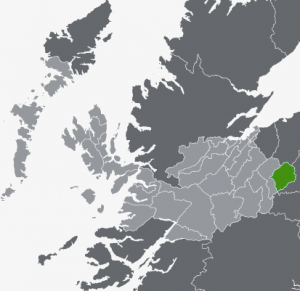
Rynerick A parish in Inverness-shire between 1870 until 1975. Before 1870 it was partly in Moray and partly in Inverness-shire. It was a parish for both civil and religious purposes from the sixteenth century until 1975.
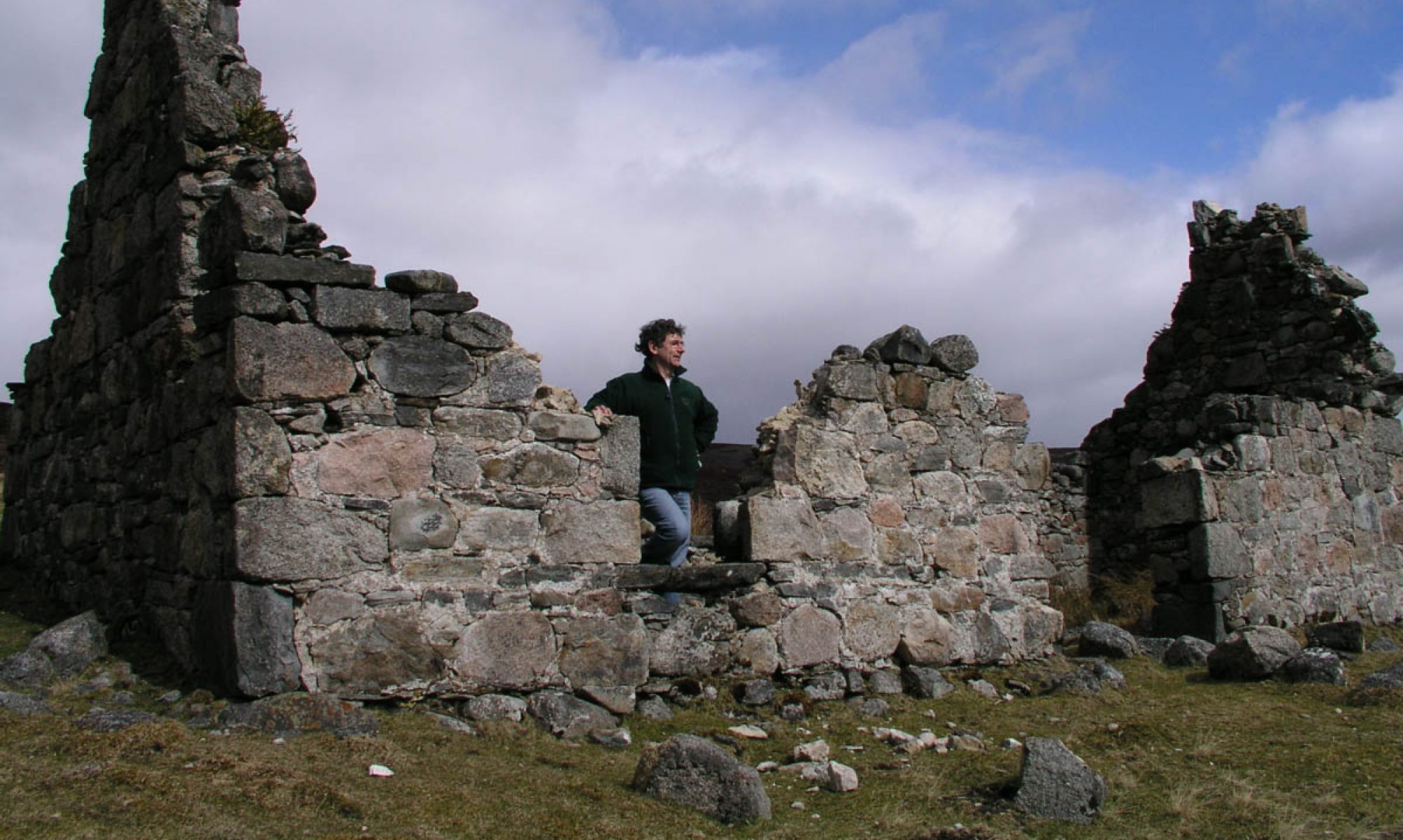
Thoughts & Opinions
Grassick Ancestry material

Rynerick A parish in Inverness-shire between 1870 until 1975. Before 1870 it was partly in Moray and partly in Inverness-shire. It was a parish for both civil and religious purposes from the sixteenth century until 1975.
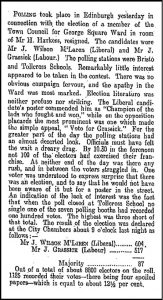
James Duncan Grassick was known in Edinburgh as a champion of the working class, and in particular the blind. Born in Leith, he lived most of his life in the poor inner-city area of St. Leonards. This part of Edinburgh was renowned for its poor sanitation and health record. For example, in 1915, 25% of the monies allocated by Edinburgh Council for “civil distress” were spent in this one ward.
St. Leonards was an area that workers aspiring for better things wanted to leave. But James Duncan was blind – as was his first wife Isabella (Bowie) Grassick – and he had little chance at a time when such disabilities were simply accepted as meaning fewer chances in life. Instea
d, he campaigned on behalf of both the blind and the workers generally. He was chairman of the local ward Labour Party, and in fact stood for election to the council in 1920, losing to the Liberal candidate in a by-election notable for its poor turn-out of 12.5%.
James Duncan was also the Blind Workers Union delegate to Edinburgh Trades Council. Interestingly, his grand-son Harry, and his great-grandson Richard, would both go on to become delegates to their local Trades Council, Harry in Edinburgh and Richard in Darlington.
James’ wife died in a tragic accident in 1907. Blind, she fell down an unattended open manhole belonging to the local Gas Board, who subsequently had to pay around £600 compensation to James, blind and widowed with two small children aged 12 (James Duncan junior) and 10 (Jane McGregor).
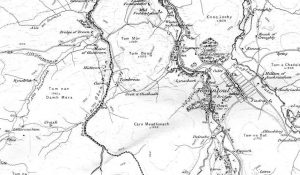
Having managed to trace my Grassick line to the parish of Abernethy and Kincardine in Inverness-shire, my wife and I decided to make a trip up there in 2006 to try to get more details. What we found from the parish records was that my ancestors lived in a small croft called Rynelrick, just to the west of the Inverness-shire-Aberdeen-shire border. Here Duncan Grassick lived with his wife Isabella Grant, until his death in November 1875. His son James, born on the last day of 1843, would later head south to Edinburgh, probably around 1860.
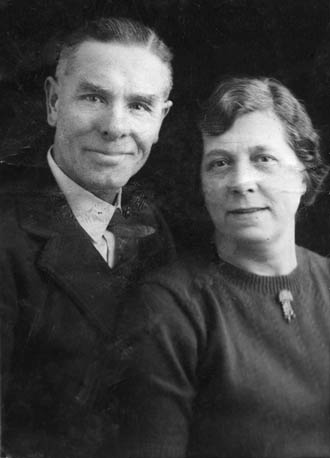
My Scottish ancestry is dominated by the fact that my paternal grand-parents were first cousins. James Duncan Grassick, born in Edinburgh in 1894, was the son of Isabella Bowie, who had married my great grand-father James Duncan (these two forenames keep cropping up in this branch of the family) five months before my grandfather’s birth. In 1921 he married Isabella’s sister Elizabeth’s daughter Jane McGregor Erskine.
The disgrace caused split the family. My father, an only child born nine months later, seems to have been quite cut off from the extended family. There were two other children, Annie Erskine and John Erskine. But my father was never really in touch with his aunt and uncle. We do know that one of Annie’s children was Bobby Combe, the legendary Hibs footballer of the 1950s who also playedfor Scotland.
For this reason, I have spent some time researching the Bowie line of the family. The Bowies moved from Linlithgow to Edinburgh sometine between 1866 and 1869. James Duncan and Jane McGregor’s grandparents lived on the High Street there, possibly with a shop since he (Thomas) was a shoe-maker and she (Jane) a dress-maker. Jane McGregor’s mother Elizabeth was born in Linlithgow in 1859. James Duncan’s mother Isabella, was born ten years later in Portobello, Edinburgh.
The Grassick line can be traced to James Duncan’s grandfather James, who was born in the parish of Abernethy and Kincardine in Inverness-shire in 1844. It must have been James who moved to Edinburgh, as he married in Leith in 1868. What caused James to leave the Highlands?
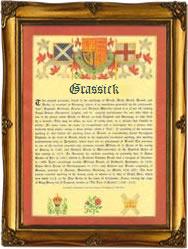 This is a rare surname of Gaelic – Scottish origins. It derives from the word “griasaich” and can have several meanings including embroiderer, decorator and more latterly, shoe or hose maker. The surname is unusual in that it is occupational when most Gaelic names were patronymics, and based upon nicknames for the original chief of the clan. It is said that Grassick is most popular in the far north and specifically Aberdeenshire, where the pronunciation is as Gracey! As a result that there are spellings as Grassie and Grass, and indeed these seem to predate the actual Grassick recordings with that of John Grasse of Kirktoun of Crathe appearing in the tenants list in 1539. However it is more likely that earlier registers have gone missing, since the keeping of such items in the past was not given any great consideration. Other early examples of recordings include Donald Graycht at Lochalsh in 1548, Elspet Grassiche of Tullochaspak in 1612, and David Grassiche of Kepache. He was a bit of a lad who was accused of “violence” in 1617, although his fate is not known. Another to fall foul of the authorities was Alexander Gresiech of Towie in 1669. He was accused of curing cattle by charming them!
This is a rare surname of Gaelic – Scottish origins. It derives from the word “griasaich” and can have several meanings including embroiderer, decorator and more latterly, shoe or hose maker. The surname is unusual in that it is occupational when most Gaelic names were patronymics, and based upon nicknames for the original chief of the clan. It is said that Grassick is most popular in the far north and specifically Aberdeenshire, where the pronunciation is as Gracey! As a result that there are spellings as Grassie and Grass, and indeed these seem to predate the actual Grassick recordings with that of John Grasse of Kirktoun of Crathe appearing in the tenants list in 1539. However it is more likely that earlier registers have gone missing, since the keeping of such items in the past was not given any great consideration. Other early examples of recordings include Donald Graycht at Lochalsh in 1548, Elspet Grassiche of Tullochaspak in 1612, and David Grassiche of Kepache. He was a bit of a lad who was accused of “violence” in 1617, although his fate is not known. Another to fall foul of the authorities was Alexander Gresiech of Towie in 1669. He was accused of curing cattle by charming them!
Read more: